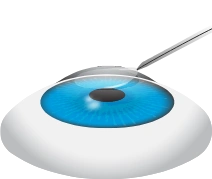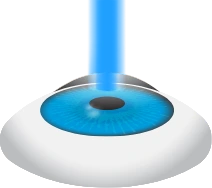
Photorefractive Keratectomy (PRK)
Skyline LASIK is Colorado Springs’ premier choice for Photorefractive Keratectomy (PRK) surgery, effectively correcting nearsightedness, farsightedness, and astigmatism. We are proud to offer the most advanced laser eye surgery technology available today and our team of elite surgeons specialize in customized PRK surgery.
What is PRK?
PRK and LASIK are closely related in their aim to improve vision, with PRK being the precursor to LASIK, offering advanced corrective eye surgery to patients for over three decades. The goal of PRK is to reshape the cornea to correct refractive errors, helping to improve vision without the use of glasses or contact
Trusted Source
What Is Photorefractive Keratectomy (PRK)?
American Academy of Ophthalmology
Go to Source
lenses.
The procedure is virtually painless, and countless patients achieve 20/20 vision or better once they have fully healed from surgery.


Good Candidates for PRK
- Are typically between the ages of 18-59
- Have a stable prescription and good eye health
- Searching for an alternative solution to contact lenses or glasses
- Have Realistic expectations
- Have thin corneas or participate in contact sports
To find out if PRK is right for you, take our 60-second Candidacy Quiz for PRK!
How is PRK different from LASIK?
PRK and LASIK are essentially the same surgery and patients enjoy the same long-term outcomes. In PRK, the outer layer of the cornea (epithelium) is completely removed and allowed to grow back naturally, while in LASIK, a flap is created within the cornea and then repositioned after the laser treatment. PRK doesn’t involve creating a flap, which can be beneficial for individuals with thin corneas or other specific medical conditions. PRK does require a longer recovery period compared to LASIK.
Preparing for PRK
Preparing for PRK involves several steps to ensure your best possible outcome. In the weeks leading up to your surgery, it’s crucial to have a consultation at our office where we will perform a thorough eye exam, assessing your overall eye health while our ophthalmologists will determine if you are a good candidate for surgery.
Prior to your visit you will need to discontinue wearing contact lenses and wear your glasses to the consultation:
- Hard contacts (RGP, Scleral) for at least 2 weeks
- Soft contacts (Monthly, Dailies, etc) for at least 3-5 days
It’s important to follow these instructions before your consultation as contacts can alter the shape of the cornea, which could potentially cause inaccurate measurements for surgery.
It’s also imperative to discuss any medications being taken, as some might affect healing and potential outcomes. Once surgery is scheduled prescription drops will be called into your local pharmacy. A few days before surgery, make sure to pick up the prescribed antibiotics and anti-inflammatory eye drops from the pharmacy along with Preservative Free artificial tears and arrange for transportation home, as you won’t be allowed to drive immediately following surgery. On the day of surgery, you should avoid drinking caffeinated beverages, and arrive with a clean face, free of makeup, lotions, or perfumes. We also ask that you not wear your contact lenses or any jewelry on the day of surgery. Proper preparation can significantly contribute to smooth surgery and optimal healing post-operatively.
What to Expect During PRK Surgery
PRK is performed using advanced laser technology in our state-of-the-art surgical suite. When you arrive, we’ll offer you a relaxing oral medication followed by anesthetic eye drops to ensure you’re comfortable and that your eyes are numb. The surgeon will begin by delicately removing a thin layer of corneal tissue known as the epithelium. Utilizing the precision of the excimer laser, the corneal tissue beneath is reshaped, and tailored to the distinctive contours of your
Trusted Source
Photorefractive Keratectomy (PRK) Eye Surgery
Cleveland Clinic
Go to Source
eye.
A protective bandage contact lens is then placed on the eye, facilitating comfort and swift healing.
- Numbing Drops
- Removal of Epithelium
- Excimer Laser Reshapes Cornea
Recovery After PRK
During PRK recovery, your cornea undergoes healing and regeneration. In the initial days post-surgery, you may experience mild to moderate discomfort, which can include a gritty feeling in the eyes, light sensitivity, and a degree of blurriness. Pain-relieving eye drops, preservative-free artificial tears, oral medications like Tylenol or Ibuprofen and a cool compress may be used to alleviate these sensations. A bandage contact is placed in each eye for comfort and to assist healing until the epithelium, or the outer layer of the cornea, is adequately regenerated before being removed at your first post-operative appointment. Using the prescribed antibiotic and anti-inflammatory eye drops is crucial to prevent infections and reduce inflammation. Frequent use of preservative free artificial tears, daily use of vitamin c and wearing sunglasses while outdoors is just as important for a smooth recovery. During the first week after surgery, it’s important for patients to avoid rubbing their eyes, wear the nighttime goggles we provided and refrain from strenuous activities. You should also avoid swimming for 1 month following surgery. You may notice vision fluctuations and gradual improvement in vision each week as you heal, complete visual stabilization can take up to 3-6 months. Post-operative visits will be scheduled to monitor your healing, ensuring recovery is on track so keeping these appointments are imperative in your outcome.

Why Choose Skyline LASIK for PRK?

Cost of PRK?
Our patients understand that clear vision is a long-term investment and PRK is a cost-effective method to diminish the ongoing expenses of eyeglasses and contact lenses. PRK will not just improve your vision and quality of life, it can potentially save you thousands. See our flexible and convenient payment options.
Ready to Get Rid of Contact Lenses & Glasses?
If you want to stop getting held back by your corrective eyewear and start waking up seeing Pikes Peak clearly, Schedule Your Consultation to see if PRK is right for you. Our distinguished team is waiting to get you on the road to visual freedom!
FAQs About PRK
How long is the recovery after PRK?
The initial recovery period takes about a week, during which the outer layer of the cornea regenerates. Patients often experience some discomfort, blurriness, light sensitivity, and fluctuations in vision during that time. Once the cornea has regenerated healing can take several weeks before your cornea returns to its initial state, with full visual recovery taking up to 3-6 months.
Are there any risks associated with PRK?
As with any surgery, there are risks. Potential complications of PRK include infection, haze (cloudiness in the cornea), under-correction, overcorrection, regression, or development of astigmatism, among
Trusted Source
Main Complications of Photorefractive Keratectomy and their Management
Clinical Ophthalmology
Go to Source
others.
However, serious complications are rare, and most side effects are treatable.
How long does the PRK take?
The actual laser treatment takes seconds though the entire surgery from beginning to end can take about 5-10 minutes for both eyes to complete. Patients should plan to be at our office for 1 to 2 hours.
Will I need to wear glasses or contacts after PRK?
Many of our patients achieve 20/20 vision or better after fully healing from PRK and do not require glasses for most activities. However, some might still need glasses for specific tasks like reading or driving at night depending on their age and circumstances.
Is the PRK Surgery painful?
Numbing drops are used during the surgery, so you’re comfortable feeling little to no discomfort. However, after surgery you may experience mild to moderate discomfort, light sensitivity, eyelid swelling or tenderness, in the first few days following surgery.
How long do the results from PRK last?
PRK offers permanent reshaping of the cornea. However, it does not prevent age-related vision changes, such as presbyopia or cataracts, which might require corrective measures in the future.
1 American Academy of Ophthalmology. What Is Photorefractive Keratectomy (PRK)? Available: https://www.aao.org/eye-health/treatments/photorefractive-keratectomy-prk. Accessed October 4, 2023.
2 Cleveland Clinic. Photorefractive Keratectomy (PRK) Eye Surgery. https://my.clevelandclinic.org/health/treatments/8596-photorefractive-keratectomy-prk-eye-surgery. Accessed October 4, 2023.
3 Clinical Ophthalmology. Main Complications of Photorefractive Keratectomy and their Management. Available: https://www.ncbi.nlm.nih.gov/pmc/articles/PMC6885542/. Accessed October 4, 2023.
The doctors at Skyline LASIK have authored or reviewed and approved this content. | Page Updated:


